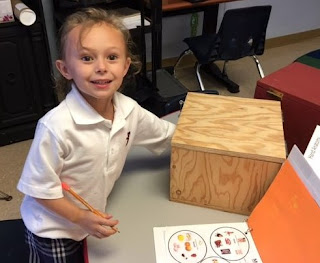See...
 |
| What if you had only one eye? |
 |
| Reading the fine print |
 |
| We can wear these cool-looking sunglasses when the sun's too bright. |
Hear...
 |
| We're listening to different sounds on the Ipads. |
 |
| What sound does the horse make? |
 |
| Yum! |
Taste...
 |
Salty, sweet, bitter, or sour?
|
Touch...
 |
| Smooth or bumpy? |
 |
| Soft or hard, hot or cold? |
Smell...
 |
| What do I smell? |
We perceive stimuli in our environment by using our senses. But is there more to life than what we perceive with our senses? We use our sense of sight, but some things are too small for our eyes to see, or too bright for us to safely view. Sometimes our vision is limited, and sometimes it's dark, and in the absence of light we must rely on other senses.
Animals perceive the world through senses that are quite different from ours. As they look at the world through their compound eyes, insects get quite a different view than we do.Their vision is not as sharp as ours, but insects such as the dragonfly can detect the minute flickers of the wings of its prey, flickers too fast for us to see. When a honeybee looks at a flower, it doesn't see what we see because many insect-pollinated flowers contain ultraviolet pigments that only their pollinating insects can see.
We use our tongues to taste, but snakes use their tongues, along with a sensory organ called Jacobson's organ, to smell. Canines hear sounds in frequencies that humans aren't able to hear. And their sense of smell is tens of thousands of times better than ours. So you could say that there's more to life than meets our ears and noses as well.
Some bats, as the children learned last week, find their way in the dark by using echolocation-bouncing sound waves off of objects.
 |
| The class loved the Echolocation Song. |
 |
| Big Friends came to help the students show what they learned about bats. |
 |
| The students wrote some "Bat Facts." |
 |
| They made construction paper bats. |
 |
| Little friends shared what they learned with their Big Friends. |
We take our five senses for granted, (that is,unless illness--like a stuffy nose or an ear infection---causes the senses to malfunction). But our senses are essential for learning about Creation and about God Himself, for when we investigate creation, we see evidence of His power, His plan, and His goodness.
Romans 1:20 "For His invisible attributes, namely, His eternal power and divine nature, have been clearly perceived, ever since the creation of the world, in the things that have been made."
We haven't had the privilege of seeing God with our eyes, or touching Him, or hearing His voice. But we do have the eyewitness accounts of those who saw Jesus, the Son of God----who walked with Him, talked with Him, ate with Him, "did life" with Him. One of those was the apostle John, who tells us:
"From the very first day, we were there, taking it all in---we heard it with our own ears, saw it with our own eyes verified it with our ow hands. The Word of Life appeared right before our eyes; we saw it happen!" I John 1:1 (The Message)
Sometimes I'm more like poor doubting Thomas, though, wanting to see with my own eyes, touch with my hands, hear with my own ears. Jesus gave Thomas the opportunity to see, to hear, to touch. But to us He says, "Blessed are those who have not seen and yet have believed." John 20: 29
How can I believe in something I can't see? I know better than to simply trust my own limited senses. Just because I don't see something, that doesn't mean it doesn't exist.
One day we will see Him face to face. But until then, we can look at the evidence in Creation, and the eyewitness accounts of those who were with Jesus when He was on earth. And we can remember that there's more to life than meets the eye.
"Eye has not seen, nor ear heard, nor have entered into the heart of a the things which God has prepared for those who love Him." I Corinthians 2:9



















No comments:
Post a Comment